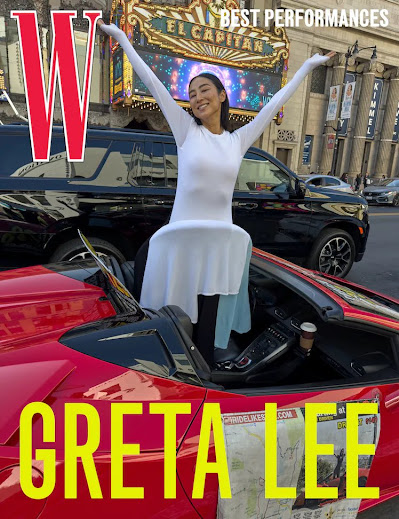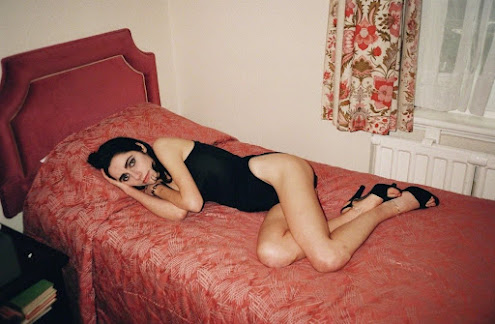Frames in Flux: Juergen Teller's Realities and Wong Kar-wai's Aesthetics in 2024
In the ever-changing landscape of artistic expression, we find ourselves drawn to the distinct realms curated by Juergen Teller and Wong Kar-wai, two influential figures situated at unique crossroads of creativity and time. Looking closer into their creations, an enthralling narrative unfolds—a narrative that not only showcases their individual genius but also illuminates the ever-shifting landscape of artistic significance throughout the ages. What becomes evident through audience reactions is a shared sense of nostalgia—a longing that transcends time. This nostalgia, more than a mere reflection of the past, is a fanciful journey into a history that is forever lost, a whimsical reverie that never truly unfolded.
 |
| Left: Juergen Teller, Right: Wong Kar-wai |
Capturing Authenticity
Captured through the lens of Juergen Teller, the latest edition of the "Best Performances" in 2024 showcases captivating images of renowned figures such as Margot Robbie, Nicolas Cage, Natalie Portman, and more. Teller's artistic vision is often described as a deliberate effort to dismantle the barrier between celebrity and non-celebrity, presenting his subjects as authentic, everyday individuals. Steering clear of the conventional glamour associated with a professional glam squad, Photoshop enhancements, and meticulously planned creative direction, Teller's style embraces the raw, unfiltered essence of his subjects. Voices on the internet do not agree certainly. Such technique is often described as "absurd", "lack of expertise", and "grandstand". Yet, it appears there exists another viewpoint regarding why certain individuals find it challenging to resonate with and are surprised by his photographs. Particularly as his earlier works received acclaim, prompting nostalgia among some.
 |
| Greta Lee, Photograph Juergen Teller |
"It often takes mere seconds for the German-born photographer to capture an image... But, he says, just because he’s nimble with the shutter doesn’t mean his images aren’t considered." In observing Juergen's photography, it's striking how little has changed in his approach from the '90s and '00s to the present day, at least from a technical perspective. Whether immortalizing pivotal moments featuring the likes of Kurt Cobain or PJ Harvey back then, or capturing today's controversial celebrity shots, it appears that, at its core, it all boils down to the simple act of pressing the camera's shutter button to record a glimpse of life.
Film vs. Digital
In the world of photography, the fundamental distinction lies in the choice between film and digital – or more specifically, the ubiquitous cell phone. Film possesses a certain enchantment that transforms seemingly ordinary scenes into something peculiar to the naked eye. The inherent graininess adds a touch of nostalgia, evoking memories and creating a subtle detachment from the photo's perspective. Even when film captures images in an absurd manner, it retains a sense of being a carefully staged performance.
On the other hand, digital (especially cell phone) photography lacks the same level of distance. With advancements in resolution and color reproduction, digital images appear more immediate and vibrant to the naked eye. The once-existing alienation between the digital photo and the viewer seems to have been effortlessly stripped away, perhaps without the viewer even being consciously aware of it. The era of film photography prioritized precision and the element of surprise, while the digital photography era shifted its focus toward immediacy and fun. These photographic habits are inherently tied to the characteristics of their respective times.
Juergen Teller's cell phone photographs elicit a visual sensation rooted in the absurdity resulting from the over-reality of the images. In the end, the unfiltered reality captured by Teller is inherently filled with absurdities. Is it the immediacy of his shots or the stark contrast between film and digital mediums across time that captivates us?
On the flip side of the globe, Wong Kar-wai has ventured into the realm of television with his inaugural series, "Blossoms Shanghai" (繁花/Fan Hua in Mandarin). This adaptation of Jin Yucheng's acclaimed novel, set in the vibrant city of Shanghai, has taken the Chinese internet by storm. Among these conversations, a prevailing sentiment has emerged: that time has evolved, and Wong Kar-wai's once-revered aesthetic may now be perceived as a relic of the past. While it's often said that timeless pursuits in art retain their allure, the discourse surrounding "Blossoms Shanghai" hints at a broader shift in audience preferences. It's evident that Wong Kar-wai's artistic style, once celebrated for its uniqueness, has undergone a transformation in response to evolving tastes and cultural sensibilities, at least in China.
Perhaps, the 1990s and the early millennium served as the perfect backdrop for Wong Kar-wai's creation of "Blossoms Shanghai." In this masterpiece, Jin Yucheng weaves a narrative that embraces silence, allowing characters to meander through their own stories. There's a deliberate dislocation of time and space, reminiscent of the enigmatic appearances and disappearances in "Days of Being Wild" and "2046", as well as the disorientation within scenes of "Ashes of Time". This bewilderment was a hallmark of that era—a time when people rushed through life on an express train, yearning for something elusive. It was a period marked by a willingness to wait, to embrace moments of foolishness, to do nothing, and to lose oneself in the day. Simultaneously, there was a sense of anticipation and ambiguity toward others, unlike the current sentiments of envy, sycophancy, cynicism, and fear that prevails today.
That's why Wong Kar-wai is so suitable for people in the prime of their youth, or reminiscing about a decade gone by. A time when our senses were keen, days stretched leisurely, and our hearts echoed the damp ambiance of Hong Kong. However, revisiting Wong Kar-wai's works in our present era sparks a peculiar sentiment—a subtle realization that the perceived time-wasting tendencies of both the filmmaker and his characters are undeniably audacious, bordering on the pretentious and naive. This realization can evoke a mix of jealousy and impatience.
Intersecting Realms: Art, Technology, and Society
In this contemporary age, the disorderly charm of that bygone era has transformed into clichés, and the once cherished inefficiencies are now condemned as the relics of an outdated time. The bewilderment that once held an enchanting allure in the face of societal norms has now evolved into the prevailing mood of our times. Consequently, Wong Kar-wai's characters and narratives, once distinctive and impactful, seem to lose their luster in the current landscape. Their grandiose declarations about love, which were once poignant, now appear as bombastic echoes of a bygone era, much like survivors clinging onto their romantic ideals.
 |
| Blossoms Shanghai |
In the realm of television, the distinctive qualities that define Wong Kar-wai's cinematic brilliance are elusive in the series "Blossoms Shanghai". Rather, it seems to adhere to a Wong Kar-wai template, characterized by step printing techniques and vibrant compositions that echo his signature style. The characters and narratives, though, depart from Wong Kar-wai's usual territory, grounding themselves in tangible issues. The characters grapple with concrete problems, occasionally breaking into triumphant smiles synchronized with the music, successfully resolving their specific crises. It's a departure from Wong Kar-wai's usual enigmatic touch, yet it manages to be a compelling drama with a well-crafted narrative, despite straying from Wong Kar-wai's character-driven storytelling.
The question arises as to whether this departure is an aesthetic exploration or an indication of the creator's repetitive and confined creative approach. In essence, "Blossoms Shanghai" emerges as a co-branded, feel-good drama with a Wong Kar-wai template – enjoyable to watch but ultimately a bit of a ruse. The series adeptly caters to the prevailing sentimental nostalgia for a supposed golden age, presenting the opportunities of that era as if on a merchandise display. It almost seems as if a vested interest is whispering to the audience, "You could have had infinite possibilities if only you had been born a decade earlier". The series plays on the promise of the past, and in a way, it becomes a timely piece of work.
Echoes of the Past, Visions of the Future
In the convergence of Juergen Teller's immediate captures and Wong Kar-wai's narrative landscapes, we bear witness to the undulating relevance of art against the passage of time. Teller's discomfiting yet captivating shots prompt us to question the nature of perception in the digital age. Conversely, Wong Kar-wai's venture into television signifies a shift in the zeitgeist. Amidst these artistic journeys, a common thread emerges – both artists, seemingly distant in their approaches, share the ability to incite contemplation on the dynamic interplay between art, technology, and the ever-evolving pulse of society. Through their lenses, we not only perceive the present but also discern the echoes of a transforming past, prompting the perennial question of how art both shapes and is shaped by the relentless march of time.





Comments
Post a Comment